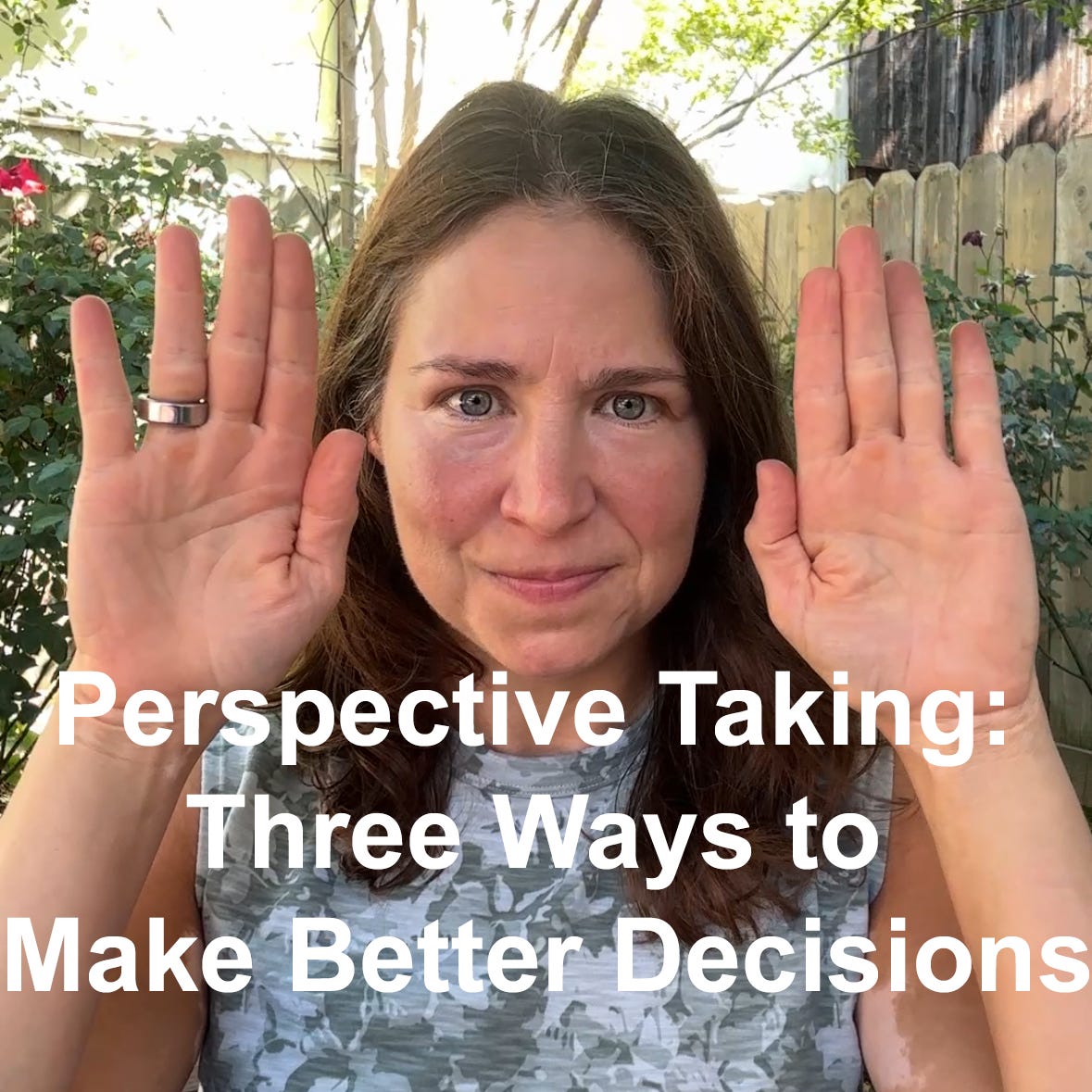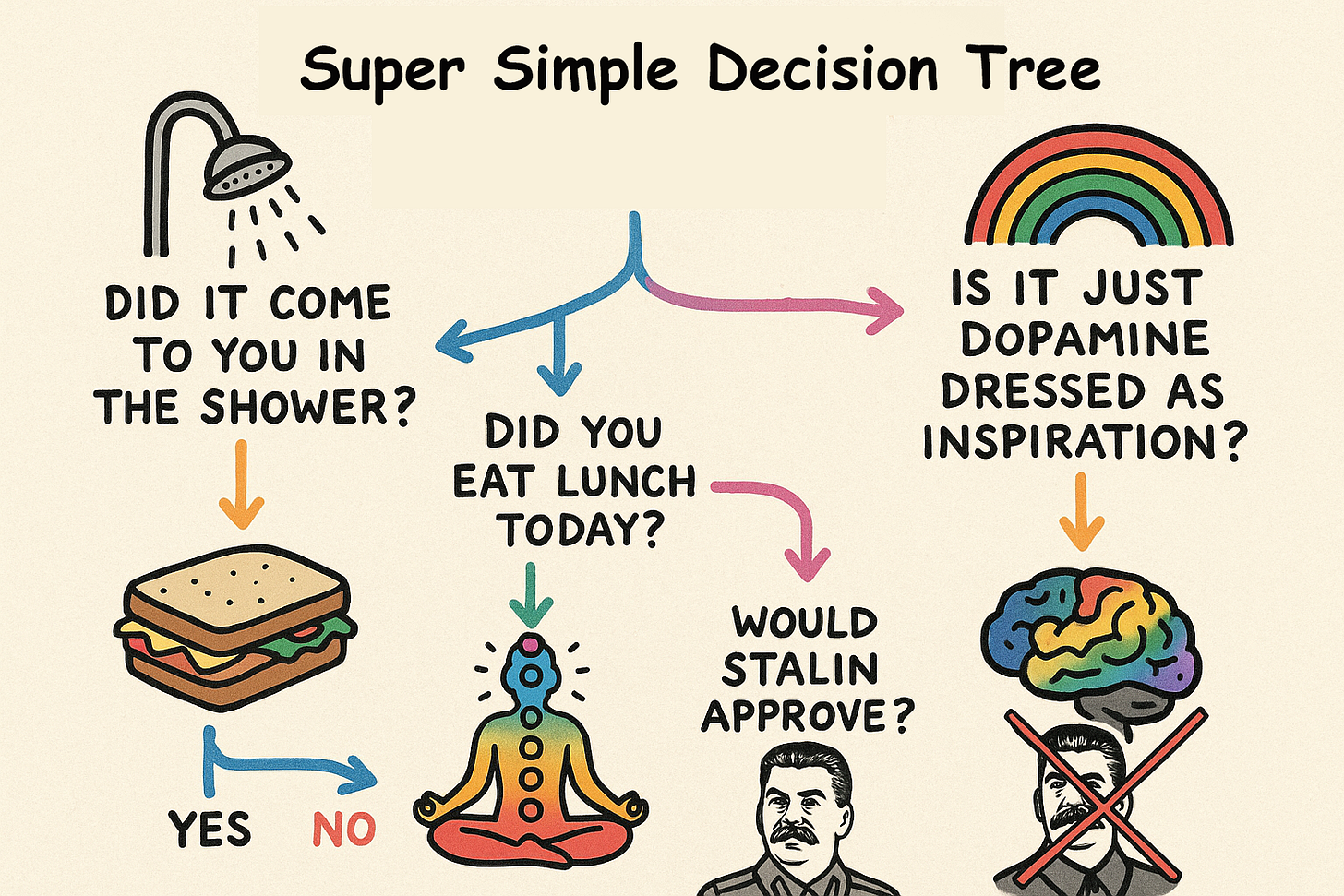Perspective Taking: Three Ways to Make Better Decisions
How to Stop Making Dumb Decisions (Even When You Really Have to Pee)
Yesterday, my band, The Mercy Kit, had a show during the SF Folk Music Festival in the Music Concourse in Golden Gate Park, San Francisco.
We were running late for our soundcheck because of traffic, and when we finally arrived, I really had to pee. I was stressed, physically uncomfortable, and laser-focused on the nearest public women’s restroom.
Meanwhile, my husband—calmer and cooler—simply mentioned he needed to use the restroom, and someone pointed him to the private “green room” bathroom. While he waltzed in and out, I waited 10 minutes in the public line.
That’s when it hit me: I didn’t pause. I didn’t ask if there might be a better option. I just charged forward with the first idea that popped into my head.
Perspective taking is about pausing—creating a little space between impulse and action—so you can see if there’s another, better choice waiting just outside your tunnel vision.
Here are three ways to stretch your perspective and avoid bee-lining into bad decisions like I did:
1. Physically Widen Your Perspective
Literally widen your field of vision. Hold your hands up and frame your face like a movie director. Look straight ahead until you can just barely see your hands in your peripheral vision. This little trick helps break the brain’s hyper-focus. It physically reminds you that there’s more to see—more options, more nuance, more perspective.
Try it now. Then decide: Do you really need that coffee before reading the rest of this article?
2. What Would Jesus, Stalin, and Groucho Do?
Here’s a wild one, inspired by an improv game called Good, Bad, and Crazy.
Imagine you’re sitting at a roundtable with six wildly different advisors. You’ve got:
Three Good voices: Maybe your mom, Google, and Jesus—offering grounded, logical, or spiritual insights.
Two Bad voices: Like Stalin and your inner saboteur—offering selfish, short-sighted, or power-hungry advice (don’t follow them, but notice what fears or desires they represent).
One Crazy voice: Groucho Marx shows up with a cigar and an outrageous idea. Maybe ridiculous. Maybe genius. Maybe both.
This isn’t about choosing the “right” voice—it’s about hearing the full internal cast and seeing what emerges. Insight often hides in contrast.
3. Ask Your Chakras First (Seriously, They’ve Got Opinions)
Before you turn to 12 friends, 3 podcasts, and a tarot deck, do this quick internal check-in:
🔴 Root – Am I solving a real problem here… or am I just bored and looking for a project?
🟠 Sacral – Do I care about this, or am I chasing someone else’s dream?
🟡 Solar Plexus – Am I actually ready to take action, or just itching to make another color-coded Trello board?
💚 Heart – Who benefits from this? (Is it someone I actually like?)
🔵 Throat – Can I explain this clearly, or does it sound like a rogue TED Talk?
🟣 Third Eye – Does this fit into my long-term vision, or did I just get FOMO from someone’s Instagram reel?
⚪ Crown – Does this align with my values—or just my need to seem impressive at dinner parties?
Watch my Chakra Meditations on my Embodied Product YouTube.
You’ll get way better insights from friends if you do this first. And way fewer “Omg, that’s so your Saturn return talking” comments.
Bonus: Ask AI for 5 Perspectives
If you’ve got access to an AI assistant (hello!), ask for five different takes on your decision—along with the pros and cons of each. It won’t give you the answer, but it’ll surface angles you might not have considered.
Whenever I get a new idea, I’m sure it’s the best one. But through a lot of trial, error, and restroom-related humbling, I’ve learned to pause, check my angles, and invite in more voices—internal and external—before charging ahead.
Start practicing these tools with low-stakes decisions—like what to eat for lunch or whether to send that text now or later. The more you build the habit of pausing and zooming out, the more natural it’ll feel when the stakes are higher. That way, when you’re stressed, pressed for time, or about to bolt toward the metaphorical public restroom, your brain will know how to slow down, breathe, and actually choose—not just react.
Got your own ways of slowing down and gaining perspective? Drop them in the comments. I’d love to hear how you make better decisions.




